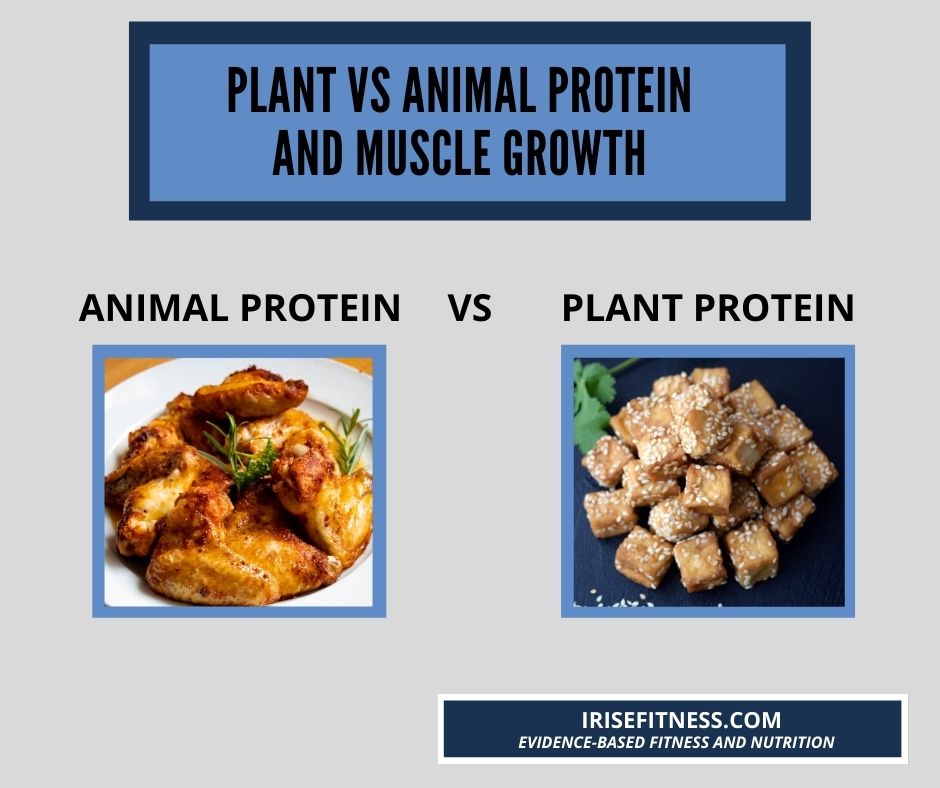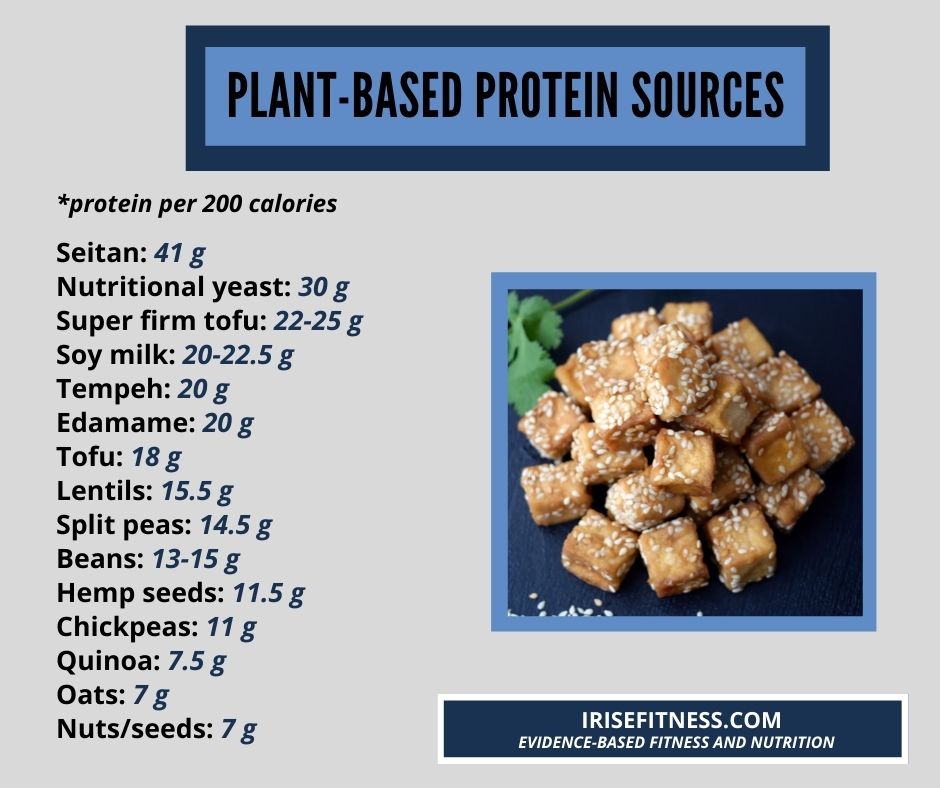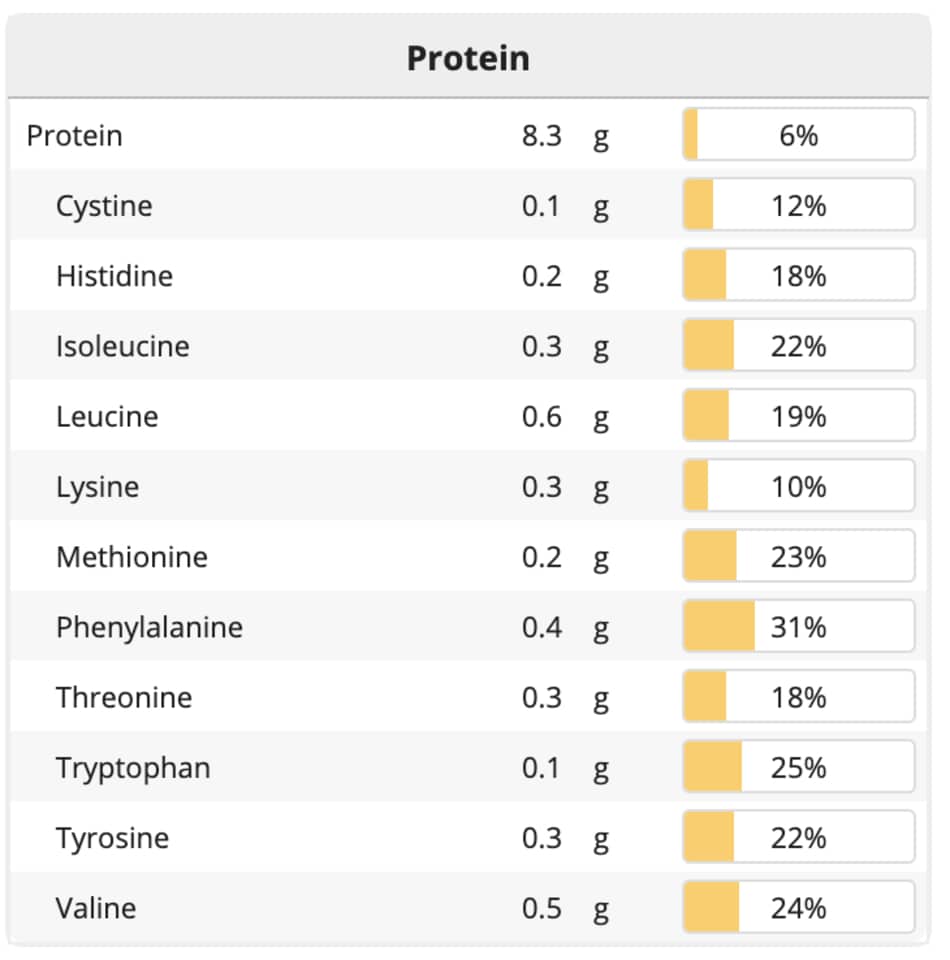
When it comes to building muscle, the differences between plant and animal protein is a hot topic, and there are many different misconceptions that you have probably heard.
Just to name one, you have probably heard something along the lines of “animal protein is complete protein whereas plant protein is incomplete protein.”
This article is designed to review these common misconceptions by looking at what the science actually shows, where these arguments come from, and why they are inaccurate.
“Animal Protein Has Higher Digestibility“
One of the main arguments people use to claim that animal protein sources are better in terms of building muscle is because of digestibility, suggesting that plant protein is harder to digest.
However, most of the data to suggest this comes from animal studies on rats, which isn’t what we care about – we care about humans.
If we look at research on humans, this 2019 review study shows that there is very little evidence showing that there is much of a difference in digestibility between animal versus plant protein. The researchers claim that “the more precise data collected so far in humans, assessing real (specific) oro-ileal nitrogen digestibility, has shown that the differences in the digestibility between plant and animal protein sources are only a few percent, contrary to historical findings in rats or determinations using less precise methods in humans.”
For example, soy protein isolate, pea protein flower or isolate, wheat flour and lupine flour all showed 89-92% digestibility, compared to eggs (91%), meat (90-94%), and milk (95%).
So in general, while there seems to be a small difference in terms of digestibility between animal and plant protein sources, the differences are only a few percent at most.
And are these differences actually meaningful when it comes to muscle growth? At the end of the day, that is what we actually care about. I’ll get into that shortly.
“Animal Protein is Better For Building Muscle”
The next common argument is that animal protein leads to more muscle development.
People who use this argument will cite studies like this one, for example, that divided participants into two groups, half of whom ate an omnivorous diet and half of whom ate a predominantly vegetarian diet. After 12 weeks of resistance training, the study found that the ominous diet group saw greater gains in lean body mass and increases in type 2 fiber size.
That being said, three years later, it was demonstrated through this study that increasing daily dietary protein intake from .78 g/kg of body weight to 1.15 g/kg (which isn’t much protein at all!) of body weight eliminated the difference between muscle mass observed between the omnivorous diet compared to the vegetarian diet.
Based on these studies, it can be inferred that if protein intake is very, very low, animal protein does seem to be superior; however, once you reach a certain amount of protein (such as 1.15 g/kg of body weight – which again, isn’t much!), there is no difference in terms of muscle growth.

“Plant Protein Is Incomplete”
The idea that plant protein is incomplete and missing essential amino acids is a myth that has been perpetuated far too long. In fact, every single plant food contains all 9 essential amino acids.
As this 2019 research review on the relevant research on dietary protein and amino acids suggests, “the claim that certain plant foods are “missing” specific amino acids is demonstrably false. All plant foods contain all 20 amino acids, including the 9 indispensable amino acids.”
Instead of calling plant protein “incomplete,” it would be more appropriate to say that certain plant foods contain lower amounts of amino acids than others.
For example, grains contain low amounts of lysine. It still contains some lysine, but just lower amounts meaning if you ONLY ate rice every single day, you would not consume sufficient amounts of the amino acid lysine.
However, that has no application to real life because nobody only eats one type of food. In reality, we eat a variety of foods so claiming that plant foods are “incomplete” proteins sources is completely misleading. As long as you eat some different plant foods throughout the day (which everyone would if you were eating a plant-based diet), then you will get enough of all the 9 essential amino acids from your diet.
If you still don’t believe me or the research that all plant foods contain all 9 essential amino acids and therefore plant foods should not be considered “incomplete” protein sources, test it out for yourself! Go on Cronometer and type in 100 grams of any plant food and you will see that every amino acid is present.
Below is an example of 1.5 cups of cooked brown rice and as you can see, while it contains lower amounts of some amino acids compared to others, all are still represented.

Lastly, it is important to note that animals do not make the 9 essential amino acids – they get them from the foods they eat. So instead of eating the animal thinking that is the only way to get the 9 essential amino acids, you could skip the “middle man” and simply eat the plants, which have all the essential amino acids you need.
You Need To “Combine” Plant Protein Sources
The idea that you need to “combine” plant protein sources is another myth that has been established for a long time and it stems from the previous argument. Because many people have been told that plants are “incomplete” protein sources that are missing certain amino acids, most people have heard that if you want to get enough of all amino acids, you need to eat “complimentary proteins” together by combining different foods in the same meal, such as rice and beans.
Even though this myth has been debunked by science for decades, it continues to persist.
As Dr. Michael Greger from Nutritionfacts.org states, there is no need to combine complementary protein. Your body “maintains pools of free amino acids that can be used to do all the complementing for us.”
In other words, our body is prepared and has stores of protein that can be used to mix and match whatever amino acids it needs in order to create proteins.
For this reason, it is almost impossible to design a diet consisting of whole foods that contains enough calories but not enough protein. This is why we do not see protein deficiencies in parts of the world where people consume an adequate number of calories.
So again, as long as you eat a variety of plant-based foods each day, you do not need to worry about “combining protein” sources as your body will take care of it for you.
Take Home Message
While many people argue as to why animal protein sources are superior to plant protein sources when it comes to building muscle, most of the research done on this topic is not even looking at the outcomes we care about.
For example, instead of looking at simply digestibility and muscle protein synthesis, we should not forget that if we care about gaining muscle and strength, then we should look at the research that includes these outcomes.
When we do, such as this brand new 2021 study shows, we see that compared to those who eat animal products to get their protein, people who eat an exclusively plant based diet show no difference in muscle mass and strength gains when protein intake is at least 1.6 g/kg of body weight (which isn’t much at all!).
Lastly, we should not only focus on which foods provide us better strength and muscle gains, but you have to ask yourself which foods and protein sources are going to optimize your overall health.
Far too often, people take a reductionist approach and only focus on small details, such as whether animal protein has a slightly higher digestibility than plant protein.
But rather, we need to ask ourselves what is our main goal of lifting weights and fueling your body? And I think most people would agree that optimizing their health is something they care about.
When you take this stance, it becomes very clear as to which foods contribute towards optimizing your health and which foods do not.
While I could reference a million studies, let’s cut to the chase. As this research suggests, “higher animal protein intake was positively, whereas plant protein was inversely, associated with mortality, especially among individuals with at least one lifestyle risk factors. Substitution of plant protein for animal protein, especially from processed red meat, was associated with lower mortality, suggesting the importance of protein source.”
If the research shows plant protein is equivalent to animal protein when it comes to building muscle, yet plant-based foods are indisputably healthier, doesn’t the choice become obvious?
I hope you learned something new in this article. If you have any questions, leave them down below and I’ll be sure to get back to you. Feel free to follow me on Facebook for daily fitness and nutrition tips at https://www.facebook.com/devin.mcnamara.77.

